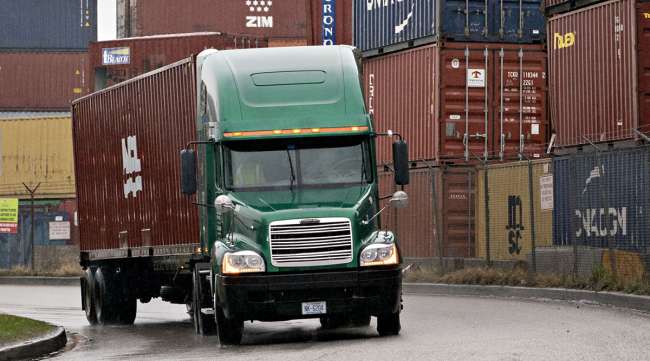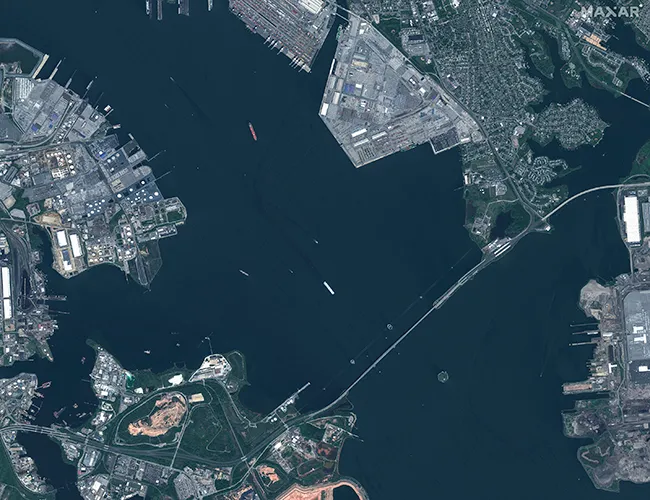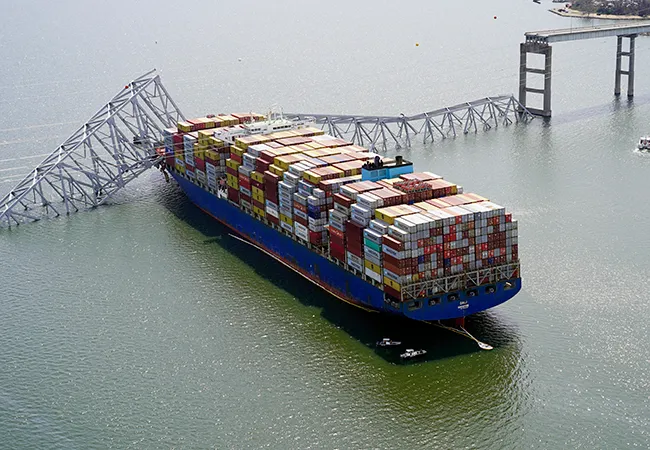Staff Reporter
Baltimore Port Truckers Pursue Regulatory Waivers

[Stay on top of transportation news: Get TTNews in your inbox.]
Emergency waivers for local, state and federal regulations are needed to avert financial hardships for truckers who cannot operate at the closed Port of Baltimore or retrieve fuel from Curtis Bay due to the collapsed Interstate 695 segment of the Francis Scott Key Bridge.
These and other concerns were raised by Louis Campion, president and CEO of the Maryland Motor Truck Association, in a March 29 letter to Paul Wiedefeld, secretary of the state transportation department, in which MMTA seeks help breaking through a web of government regulations on six key trucking issues.
Along with the Commercial Vehicle Safety Alliance, MMTA identified relevant agencies as: the Federal Motor Carrier Safety Administration and U.S. Small Business Administration, as well as the state DOT, Motor Vehicle Administration, Comptroller’s Office and Department of Commerce. Surrounding state driver licensing agencies also may be involved.
“Right now, some members are still busy because they are clearing loads that were already on the [port] terminal, but that will not last. We would anticipate that there will be a significant drop-off of work next week sometime,” Campion told Transport Topics in late March. “Many smaller carriers who do not regularly travel across state lines are making plans for how they can continue to serve their customers in places like Philadelphia or Norfolk.”
MMTA said many emergency regulation waivers are meant to provide disaster relief, but fail to take into account freight movements.
“While some may not view a freight shift to another port or another mode of transportation as a disaster, for the local intermodal trucking industry it is one. The Port of Baltimore relies greatly on the motor carrier industry and the independent owner-operator to move the containers, automobiles and breakbulk products that traverse its terminals,” Campion’s letter emphasized.
Wiedefeld is asked to be an intermediary with Gov. Wes Moore “to ensure swift action is taken to protect those motor carriers who are now at risk due to the loss of freight and/or increased operating costs” as they seek to continue serving customers diverting freight to other ports.

This satellite image provided by Maxar Technologies shows the overview of the Francis Scott Key Bridge in Baltimore, Md., on May 6, 2023. (Maxaar Technologies via Associated Press)
“While all trucking sectors are likely to feel some operational and financial impacts from this tragedy, the most directly impacted will be those motor carriers that operate at the Port of Baltimore and those who pick up fuel in Curtis Bay,” the letter stated.
Now port drivers must travel longer distances and transport cargo under different regulations that didn’t apply to port trucks, which will cause constraints for an unknown length of time given the complexities in repairing/replacing the collapsed bridge.
For hazardous material haulers, such as those transporting gas, the bridge was the primary route to pick up fuel in Curtis Bay for delivery to Baltimore’s east side. Now these drivers will have to travel 30 additional miles along the west side of I-695 to make deliveries.
“For intermodal trucking companies, the challenge is even greater. Many are scrambling to pick up their customers’ loads in Norfolk — approximately 238 miles and 4½ hours from the Port of Baltimore. When factoring in cargo loading times, drivers will be strained to complete a single round trip within the 11-hour driving window,” Campion’s letter stated.
MMTA is asking for these emergency regulatory measures:
- Extending driver hours of service from the 11-hour maximum drive time by two hours.
- Opening limited routes to avoid traffic congestion caused by Baltimore tunnel restrictions for motor fuel haulers (such as making the city’s Eastern Avenue a “through route”).
- Issuing an exception to mandatory electronic logging devices.
“Under federal law, drivers are required to use electronic logging devices to track their hours of service, with an exception for shorthaul operators who stay within a 150-air-mile radius,” the MMTA letter stated. “Many drivers operating at the Port of Baltimore do not have electronic logging devices because they only operate locally within 150 air miles. Now those drivers are being diverted to Norfolk, which is outside the shorthaul limit.”
Ninety-day waivers are being sought for truckers hauling freight to/from a seaport in adjacent states both for apportioned vehicle registrations under the International Registration Plan Inc. and International Fuel Tax Association agreement decal requirement.
Motor carriers with qualifying vehicles traveling in two or more jurisdictions (such as Maryland and Virginia) are required to be registered under IRP and display “apportioned” license plates from the Maryland Motor Vehicle Administration. MMTA noted that “many of our port drivers have only operated locally and do not have apportioned tags that allow them to travel across state lines. This prevents them from picking up loads in Norfolk or Philadelphia.”

The cargo ship Dali is stuck under part of the structure of the Francis Scott Key Bridge. (Maryland National Guard via Associated Press)
Financial support is also needed for local businesses, not just for port workers. MMTA noted that until the waterways are reopened for delivery, “the blockade of the Patapsco River will choke off economic activity for local trucking companies. Many will be unable to survive in the days and weeks ahead without financial assistance.”
It referenced Small Business Administration loans granted to Philadelphia companies last year to mitigate financial struggles arising from a major damaged bridge.
“We urge the exploration of all available financial resources that would include trucking. A life support will be needed for many of these local businesses to keep them afloat,” MMTA noted. “Without this, the port will have substantially reduced truck capacity to move freight when volumes are restored.”
It urged government officials to react quickly to ensure trucks continue providing critical transportation for Maryland’s manufacturing, agricultural and retail industries.
Want more news? Listen to today's daily briefing below or go here for more info:




